NAKBA 2.0
Palestinians recount painful history with war in Gaza as a reminderNOREEN NASIR
CNN
Wed, May 15, 2024
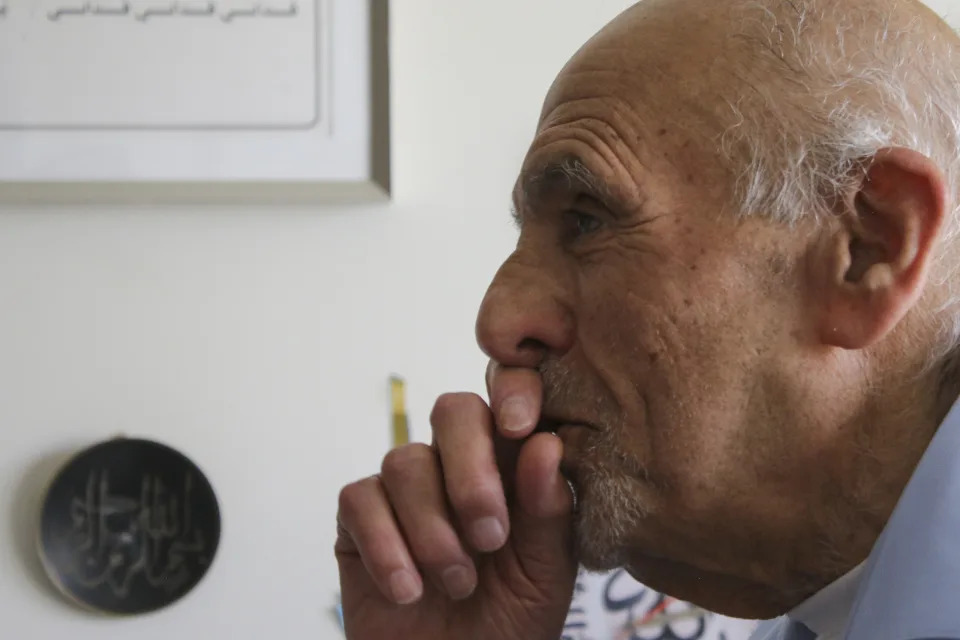
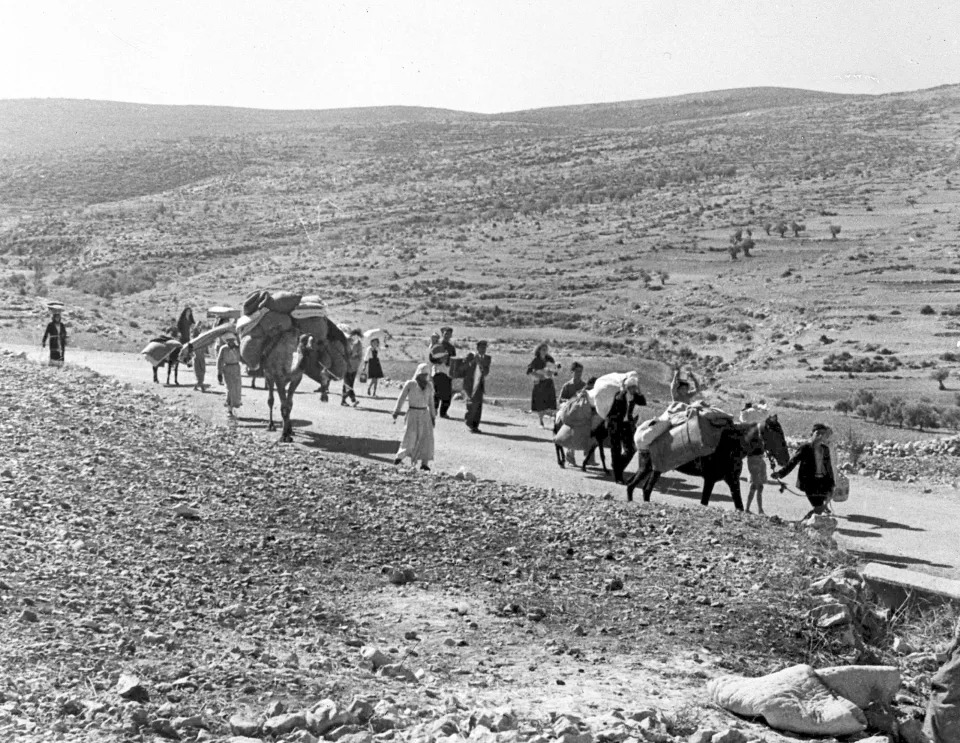
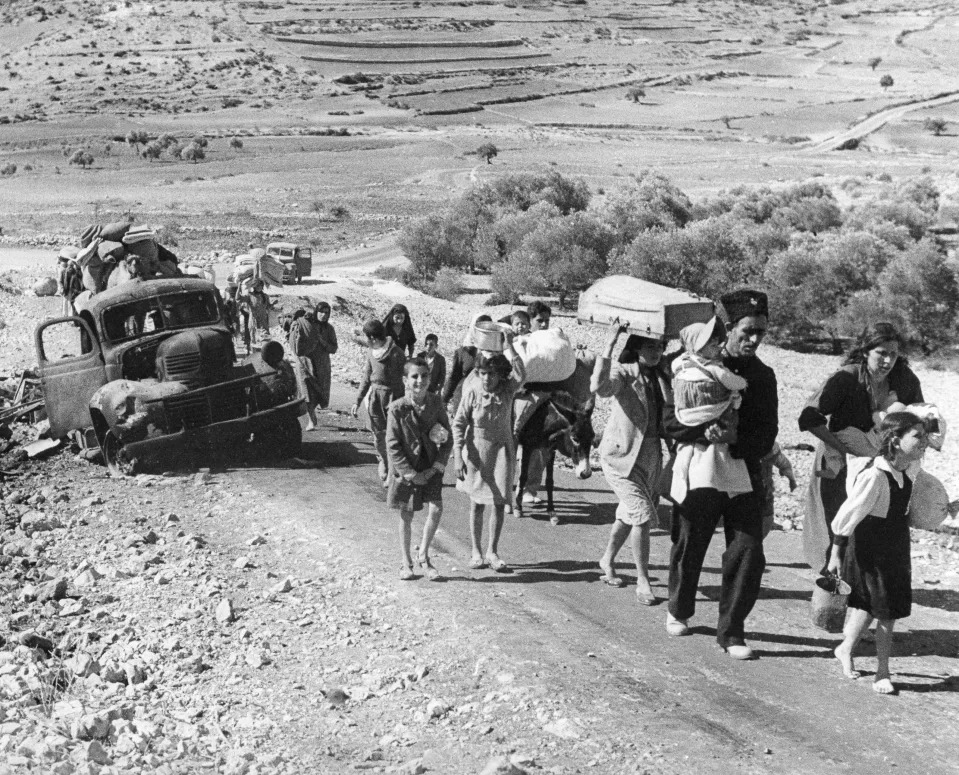


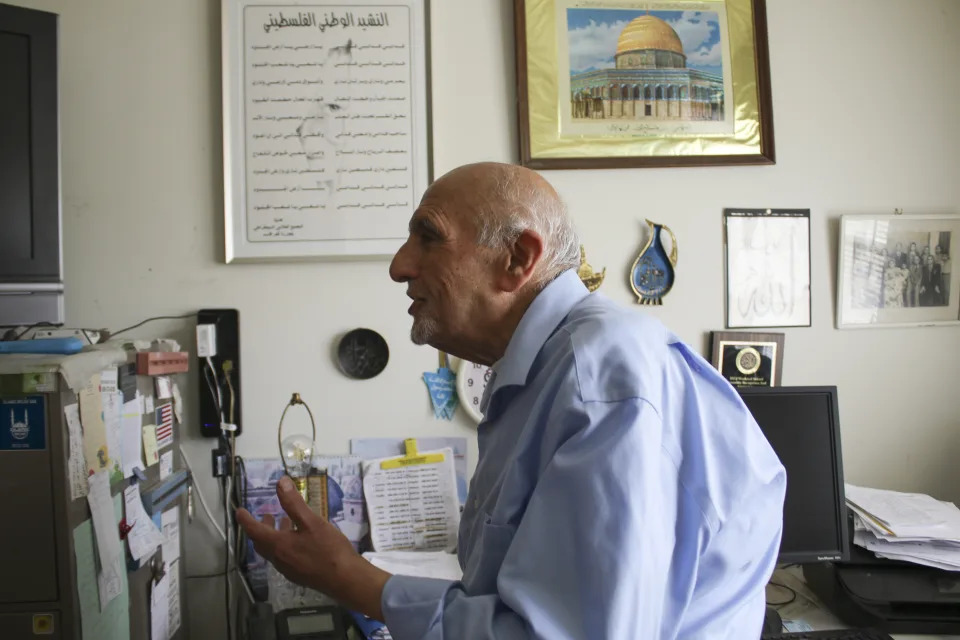
Nakba Day Refugees Remember
Dawud Assad, 92, stands in front of Palestinian decor in his home in Monroe Township, N.J., on May 11, 2024.
Wed, May 15, 2024






Nakba Day Refugees Remember
Dawud Assad, 92, stands in front of Palestinian decor in his home in Monroe Township, N.J., on May 11, 2024.
(AP Photo/Noreen Nasir)
Dawud Assad still has nightmares of the day Jewish militias attacked his village of Deir Yassin outside Jerusalem 76 years ago.
Assad, then 16, peered out his front window to see his village ablaze. As his uncles shot back at the militias firing upon them, Assad escaped. But more than 100 Palestinians, including women, children and elderly people, were killed in what is now referred to as the Deir Yassin massacre.
Assad lost 27 members of his extended family that day, including his grandmother and his two-year-old brother, Omar.
“I don’t know how I escaped,” Assad said. “They called me the living martyr.”
That massacre, other attacks on Palestinian villages, and the 1948 war surrounding Israel’s creation spurred what is called the Nakba, the Arabic word for catastrophe. It refers to the exodus of some 700,000 Palestinians who fled or were forced from what is now Israel.
Nakba remembrances have taken on new significance this year, as more than twice that number have been displaced within Gaza since the start of Israel-Hamas war, which was triggered when militants from Gaza attacked Israel on Oct. 7.
WHAT LED TO THE NAKBA?
Even before 1948, a series of events and declarations paved the way for the traumatic event that would shape what Palestinians see as a decades-long struggle for justice and their right to return, something Israel has denied them.
“This process of displacement has been going on for over a century now,” said Beshara Doumani, a professor of Palestinian studies at Brown University.
Decades before 1948, Jews escaping antisemitism and persecution in Europe sought to establish a Jewish state in a place they considered their ancestral homeland. In November 1947, after World War II and the Holocaust, the U.N. General Assembly passed a resolution to partition Mandatory Palestine, controlled by the British, into two states – one Arab and one Jewish.
The majority of Palestinians and the wider Arab world rejected the resolution.
After Israel declared independence on May 14, 1948, and the departure of British forces, armies of neighboring Arab nations invaded, spurring the war.
Assad, who is now 92 and lives in Monroe Township, New Jersey, initially fled with others to the village of Ein Karem after escaping Deir Yassin.
Leila Giries, 84, remembers when people from Deir Yassin arrived in Ein Karem, bringing news of their escape. Fearing for their own safety, Giries’ family fled for what they thought would be a brief respite from the violence.
“We left everything. We walked out with the clothes on our back,” said Giries. “Everybody said in a couple of weeks, we'd be back."
Israel holds the Palestinians and Arab states responsible for the events of 1948 because they rejected the U.N. partition plan and declared war. It also notes that Palestinians who did not leave in 1948 are Israeli citizens.
Israel rejects the idea of a right of return because if it was fully implemented it would threaten its existence as a Jewish-majority state. And it notes that hundreds of thousands of Jews were forced out or fled Arab countries in the wake of Israel's founding and were absorbed by the newly independent country.
Israeli leaders have said the Palestinian refugees should be absorbed by neighboring Arab states or in a future Palestinian state. The fate of the refugees was a major point of contention in peace talks going back to the 1990s.
WHAT HAPPENED TO PALESTINIANS AFTER THE NAKBA?
“The overwhelming majority of Palestinians became displaced after the Nakba, even if they didn’t leave Palestine,” said Doumani.
More Palestinians fled in the years after 1948, including during the 1967 Middle East war, when Israel captured the West Bank, east Jerusalem and Gaza. Some fled for a second time.
Many of the now six million Palestinian refugees and their descendants live in slum-like urban refugee camps in the West Bank and Gaza, as well as in Lebanon, Syria and Jordan. Others ended up outside the Middle East and built communities in places like Chile or the U.S.
Some Palestinians say the Nakba never ended because Israeli settlers have continued to encroach upon their land in the West Bank, sometimes engaging in violent actions. The international community considers Israeli settlements to be illegal.
CAN REFUGEES RETURN TO THEIR HOMES?
As early as December 1948, a U.N. General Assembly resolution called for refugee return, property restitution and compensation, and proponents of the right to return see it as a human right protected by international law.
But that return never happened.
“The most important turning point was not the expulsion or the flight due to war conditions or massacres, but rather the decision not to allow them back,” said Doumani.
Giries, who now lives outside Los Angeles, still has the key to her family’s home, though the building itself is no longer there. The key has become a symbol for her — of the home lost during the Nakba and her inability to return.
To be Palestinian, she said, is to have a fractured identity. She remembers coming to the U.S. as a teenager and being told there was no such thing as “Palestine.”
“Okay, so there is no such thing as Palestine. How do you account for me?” said Giries.
WHAT SIGNIFICANCE DOES THE NAKBA ANNIVERSARY HOLD TODAY?
The refugees and their descendants make up around 75% of Gaza’s population.
Hamas killed some 1,200 people and took another 250 hostage during its Oct. 7 attack. Israel responded with one of the heaviest military onslaughts in recent history, killing more than 35,000 Palestinians, according to Gaza's Health Ministry.
Families in Gaza have been forced to evacuate to different locations numerous times in the last seven months after receiving warnings from the Israeli military, and tens of thousands of people now live in tents. Israeli officials say the evacuations are aimed at sparing civilian life as they combat Hamas fighters.
But many in Gaza say they have nowhere to go, with entire neighborhoods destroyed. The fear now is if Palestinians leave Gaza altogether, they, like those who were forced to leave in 1948, will never be allowed to return.
“I keep telling my kids I'm glad that my parents are not alive to see another Nakba,” Giries said.
For Assad, the images of children killed or maimed by Israeli airstrikes in the last several months take him back to the sight of his lifeless two-year-old brother in 1948.
“What did they do? Why did they have to die, small ones like this?,” he said.
WHAT EVENTS ARE PLANNED AROUND THE WORLD?
Across the Middle East, Palestinians are marking the Nakba with their eyes on the war in Gaza. Demonstrations and educational events are planned.
In Chile, which has what is considered the largest Palestinian community outside the Middle East, events and actions that highlight the Nakba will take place throughout May.
There are events planned across the U.S., too. In Washington, D.C., a group of federal employees gathered outside the White House on Wednesday for a “day of remembrance” and to protest the U.S. government's backing of the Israeli military's offensive in Gaza. A rally is planned for Saturday on the National Mall.
Protesters in Chicago commemorated the Nakba during a rally last weekend, and in Paterson, New Jersey, which holds one of the largest Palestinian communities in the U.S., organizers are holding an annual “Palestine Day on Palestine Way” event on Sunday.
___
Associated Press reporter Nayara Batschke in Santiago, Chile, contributed.
Chicago college students mark 76th "Nakba" amid protests against war in Gaza
Dawud Assad still has nightmares of the day Jewish militias attacked his village of Deir Yassin outside Jerusalem 76 years ago.
Assad, then 16, peered out his front window to see his village ablaze. As his uncles shot back at the militias firing upon them, Assad escaped. But more than 100 Palestinians, including women, children and elderly people, were killed in what is now referred to as the Deir Yassin massacre.
Assad lost 27 members of his extended family that day, including his grandmother and his two-year-old brother, Omar.
“I don’t know how I escaped,” Assad said. “They called me the living martyr.”
That massacre, other attacks on Palestinian villages, and the 1948 war surrounding Israel’s creation spurred what is called the Nakba, the Arabic word for catastrophe. It refers to the exodus of some 700,000 Palestinians who fled or were forced from what is now Israel.
Nakba remembrances have taken on new significance this year, as more than twice that number have been displaced within Gaza since the start of Israel-Hamas war, which was triggered when militants from Gaza attacked Israel on Oct. 7.
WHAT LED TO THE NAKBA?
Even before 1948, a series of events and declarations paved the way for the traumatic event that would shape what Palestinians see as a decades-long struggle for justice and their right to return, something Israel has denied them.
“This process of displacement has been going on for over a century now,” said Beshara Doumani, a professor of Palestinian studies at Brown University.
Decades before 1948, Jews escaping antisemitism and persecution in Europe sought to establish a Jewish state in a place they considered their ancestral homeland. In November 1947, after World War II and the Holocaust, the U.N. General Assembly passed a resolution to partition Mandatory Palestine, controlled by the British, into two states – one Arab and one Jewish.
The majority of Palestinians and the wider Arab world rejected the resolution.
After Israel declared independence on May 14, 1948, and the departure of British forces, armies of neighboring Arab nations invaded, spurring the war.
Assad, who is now 92 and lives in Monroe Township, New Jersey, initially fled with others to the village of Ein Karem after escaping Deir Yassin.
Leila Giries, 84, remembers when people from Deir Yassin arrived in Ein Karem, bringing news of their escape. Fearing for their own safety, Giries’ family fled for what they thought would be a brief respite from the violence.
“We left everything. We walked out with the clothes on our back,” said Giries. “Everybody said in a couple of weeks, we'd be back."
Israel holds the Palestinians and Arab states responsible for the events of 1948 because they rejected the U.N. partition plan and declared war. It also notes that Palestinians who did not leave in 1948 are Israeli citizens.
Israel rejects the idea of a right of return because if it was fully implemented it would threaten its existence as a Jewish-majority state. And it notes that hundreds of thousands of Jews were forced out or fled Arab countries in the wake of Israel's founding and were absorbed by the newly independent country.
Israeli leaders have said the Palestinian refugees should be absorbed by neighboring Arab states or in a future Palestinian state. The fate of the refugees was a major point of contention in peace talks going back to the 1990s.
WHAT HAPPENED TO PALESTINIANS AFTER THE NAKBA?
“The overwhelming majority of Palestinians became displaced after the Nakba, even if they didn’t leave Palestine,” said Doumani.
More Palestinians fled in the years after 1948, including during the 1967 Middle East war, when Israel captured the West Bank, east Jerusalem and Gaza. Some fled for a second time.
Many of the now six million Palestinian refugees and their descendants live in slum-like urban refugee camps in the West Bank and Gaza, as well as in Lebanon, Syria and Jordan. Others ended up outside the Middle East and built communities in places like Chile or the U.S.
Some Palestinians say the Nakba never ended because Israeli settlers have continued to encroach upon their land in the West Bank, sometimes engaging in violent actions. The international community considers Israeli settlements to be illegal.
CAN REFUGEES RETURN TO THEIR HOMES?
As early as December 1948, a U.N. General Assembly resolution called for refugee return, property restitution and compensation, and proponents of the right to return see it as a human right protected by international law.
But that return never happened.
“The most important turning point was not the expulsion or the flight due to war conditions or massacres, but rather the decision not to allow them back,” said Doumani.
Giries, who now lives outside Los Angeles, still has the key to her family’s home, though the building itself is no longer there. The key has become a symbol for her — of the home lost during the Nakba and her inability to return.
To be Palestinian, she said, is to have a fractured identity. She remembers coming to the U.S. as a teenager and being told there was no such thing as “Palestine.”
“Okay, so there is no such thing as Palestine. How do you account for me?” said Giries.
WHAT SIGNIFICANCE DOES THE NAKBA ANNIVERSARY HOLD TODAY?
The refugees and their descendants make up around 75% of Gaza’s population.
Hamas killed some 1,200 people and took another 250 hostage during its Oct. 7 attack. Israel responded with one of the heaviest military onslaughts in recent history, killing more than 35,000 Palestinians, according to Gaza's Health Ministry.
Families in Gaza have been forced to evacuate to different locations numerous times in the last seven months after receiving warnings from the Israeli military, and tens of thousands of people now live in tents. Israeli officials say the evacuations are aimed at sparing civilian life as they combat Hamas fighters.
But many in Gaza say they have nowhere to go, with entire neighborhoods destroyed. The fear now is if Palestinians leave Gaza altogether, they, like those who were forced to leave in 1948, will never be allowed to return.
“I keep telling my kids I'm glad that my parents are not alive to see another Nakba,” Giries said.
For Assad, the images of children killed or maimed by Israeli airstrikes in the last several months take him back to the sight of his lifeless two-year-old brother in 1948.
“What did they do? Why did they have to die, small ones like this?,” he said.
WHAT EVENTS ARE PLANNED AROUND THE WORLD?
Across the Middle East, Palestinians are marking the Nakba with their eyes on the war in Gaza. Demonstrations and educational events are planned.
In Chile, which has what is considered the largest Palestinian community outside the Middle East, events and actions that highlight the Nakba will take place throughout May.
There are events planned across the U.S., too. In Washington, D.C., a group of federal employees gathered outside the White House on Wednesday for a “day of remembrance” and to protest the U.S. government's backing of the Israeli military's offensive in Gaza. A rally is planned for Saturday on the National Mall.
Protesters in Chicago commemorated the Nakba during a rally last weekend, and in Paterson, New Jersey, which holds one of the largest Palestinian communities in the U.S., organizers are holding an annual “Palestine Day on Palestine Way” event on Sunday.
___
Associated Press reporter Nayara Batschke in Santiago, Chile, contributed.
As Jewish people around the world celebrated Israel's independence day this week, for Palestinians, it marked what is known as the "Nakba," or "catastrophe," when more than 700,000 Palestinians were displaced in 1948 to make way for the state of Israel. It was a moment in history with ramifications that are still being felt today amid the war in Gaza. Students in the Chicago area observed the 76-year mark of the Nakba on Wednesday, including a walk-out at DePaul University.
Alexander Hamilton High School students walk out in Milwaukee to support Palestinians on Nakba Day
Rory Linnane, Milwaukee Journal Sentinel
Wed, May 15, 2024

Students from Alexander Hamilton High School hold a "Free Palestine" sign outside their school Wednesday in Milwaukee.
Shahd Abdelrahman was a little worried Wednesday afternoon about getting suspended when she walked out of Alexander Hamilton High School at 2:50 p.m., about a half-hour before the final bell.
But heavier on her mind were her great-grandparents. May 15 marks the 76th anniversary of what's known as the Nakba, when her grandparents were among over 700,000 Palestinians who were expelled from their homes as part of the establishment of Israel.
Abdelrahman and about 30 other students recognized the anniversary Wednesday by walking out of class and marching on the front lawn of the school at 6215 W. Warnimont Ave. on Milwaukee's southwest side. Abdelrahman held a cardboard sign that read, "Existence is resistance."
The Nakba, which means catastrophe in Arabic, permanently displaced most of the Palestinian population, according to the United Nations, whose calls for the right of refugees to return to their land were rejected by Israel.
The anniversary comes this year as the Israeli military campaign has displaced most of the Palestinian population of Gaza and killed more than 35,000 people. As Reuters reported, Palestinians fear that like the 1948 Nakba, they may never be able to return to their communities.
Students across the country joined protests Wednesday in recognition of the Nakba, while calling for an end to the current attacks on Gaza. High school students, while lower profile than the college campus encampments, have organized multiple protests of their own in Wisconsin in recent weeks.
The students at Hamilton High School have also run bake sales to raise about $300 for care packages for Palestinians. Many of the students are part of Youth Empowered in the Struggle, the youth arm of Voces de la Frontera, an advocacy organization for the rights of immigrants and workers.
On Wednesday afternoon, the Hamilton students circled the lawn and paused to give speeches on a megaphone. Students urged Abdelrahman to speak.
"Thank you all for coming. As a Palestinian myself, I don't understand how someone could just, go and like," Abdelrahman said before becoming choked up. Three friends surrounded her with hugs and another student picked up where she left off.
"This is a very important day for everyone," said Yazmari Perez, 17. "This won't end until the massacre and the genocide ends."
Many of the students at Hamilton, where state data show over a quarter of students are English language learners, come from families who had to leave their home countries — like Zadarha, a Rohingya 11th grader who didn't want to share her last name.
"Even though I'm not Palestinian, I am Muslim, and I am a human being, and I believe everyone deserves justice and peace, and we all support anyone who is struggling and surviving through it."
Several Muslim students said that while they were celebrating Eid this year with feasts, they were also watching videos of Palestinians who had only boiled grass.
Siti, a 10th grader who didn't want to share her last name, said she sees images of displaced Palestinians and she thinks of her parents who fled Myanmar. She's noticed that people in Gaza are often smiling in videos of daily life.
"If you look at them, they're smiling, but deep down they're all hurt and we all know that," Siti said.
About an hour after they started marching, students caught school buses and headed home.
Nicole Armendariz, communications director for Milwaukee Public Schools, said no disciplinary action will be taken against the students. She said adults accompanied the students during the event to ensure safety and supervision.
"Milwaukee Public Schools is proud of creating an environment that fosters strong leaders who think critically about the issues that matter to them," Armendariz said in a statement. "We strive to create an environment that is supportive and inclusive to all."
Palestinians mark Nakba Day, and ask what's next as Gaza becomes 'uninhabitable' amid war
Hannan Adely, NorthJersey.com
Updated Wed, May 15, 2024
Palestinians across the world mark Nakba Day on Wednesday, an event commemorating the mass expulsion from their homes during the conflict that created the State of Israel in 1948.
This year, Palestinian Americans say they are remembering the Nakba, meaning “catastrophe,” with sorrow and fear as they watch events unfold in Gaza. Images of Palestinians fleeing on foot, with whatever they can carry, or huddled in tents in makeshift refugee camps, evoke painful memories of the past.
The turmoil took place after the 1947 United Nations vote to partition Palestine for Jews and Arabs. The movement for a Jewish state went back decades and gained international support after the Holocaust, as persecuted Jews sought refuge from antisemitism and a national home. In the ensuing conflict, some 750,000 Palestinians fled or were expelled from their homes.
New Jersey is home to large Jewish and Palestinian populations, many of whom have close ties to the region. Amjad Abukwaik, a Verona resident, said his family fled fighting in 1948 "assuming they would come back the next day." As refugees, they settled in Ramallah in the West Bank, in Jordan and in Gaza, where he was born.
The situation for Palestinians today is far more dire, Abukwaik said.
“The level of destruction, the level of killing, it’s just so much worse now,” he said. “Even [wars in] ‘48 or ‘67 were a few days long. This has been going on for seven, almost eight months now.”

People and first responders search the rubble of a building that collapsed following an Israeli air strike in the Rafah refugee camp in the southern Gaza Strip on March 20, 2024 amid the ongoing conflict in the Palestinian territory between Israel and the militant group Hamas.
Gazans remain in their densely populated land that the United Nations now calls “uninhabitable” due to widespread destruction in the war. Foreign powers, including Israel, the United States and Arab nations, debate what postwar Gaza should look like.
“We are hoping Gaza and Palestine will always be there because it is our homeland and where we are raised,” said Enas Ghannam, a Gaza resident who was visiting the United States for the Palestine Writes Literature Festival when war broke out. She is staying with a relative in New Jersey.
What is next for Israel and Gaza?
On Tuesday, Israel marked Independence Day with toned-down celebrations to mark its founding, also in the shadow of the war with Hamas.
Israel does not want Hamas to return to power after its attack on Oct. 7, which killed 1,200 Israelis, with another 250 taken hostage. The government said the goal of its ongoing military campaign in Gaza is to eliminate Hamas, which it views as a threat to Israel. Hamas has been designated a terrorist organization by the U.S. and others.
Israeli Prime Minister Benjamin Netanyahu discussed in February a plan for Israel to keep security control over Palestinian areas after the war and make reconstruction dependent on demilitarization, Reuters reported. But some far-right leaders in Israel are calling for Jews to resettle Gaza.
"First, we must return to Gaza now! We are coming home to the Holy Land! And second, we must encourage emigration. Encourage the voluntary emigration of the residents of Gaza. It is moral," National Security Minister Itamar Ben-Gvir said at a far-right Independence Day march, the Israeli newspaper Haaretz reported.
Last week, President Joe Biden told CNN that he was working with Arab states that are prepared to rebuild Gaza and help with the transition to a two-state solution. Netanyahu has opposed a two-state solution.
The international discussions over the fate of Gaza are troubling to Palestinians, who say they should be the ones to decide their future.
'Palestinians have not lost hope': 75 years after Nakba, diaspora in NJ seek homecoming
People are mourning
Abukwaik struggled to talk about the future, consumed by the crisis still gripping Gaza. More than 35,000 Palestinians have been killed, with thousands more believed buried under rubble, including 40 of his family members. Three were killed Saturday by a missile strike following Israeli evacuation orders and fleeing Rafah, the southern city now under attack, he said.
“People are bleeding,” he said. “People are starving. People cannot even find gauze. The question is, will Gaza be left? Will there be people in Gaza to talk to about this?”
In Israel, people continue to mourn for the hostages who remain in Hamas custody, pleading and rallying for their safe release. Of 252 people abducted on Oct. 7, 128 remain in Gaza, according to Israeli tallies. At least 36 of them have been declared dead, Reuters reported.
Israel was founded as a national home for Jews, 6 million of whom were killed during the Holocaust. But the Oct. 7 attack shook their sense of safety.

Yael Alexander of Tenafly was joined by other American and Israeli relatives of hostages who gathered in New York to raise awareness and call for the release of the 136 people who remain in Hamas custody in Gaza on Jan. 14, 2024.
Any postwar planning must include discussion about long-term resolutions for the region, said Sa'ed Atshan, associate professor of Peace and Conflict Studies and Anthropology at Swarthmore College.
"We have to imagine a better tomorrow, that violence can end, that freedom and justice and equality can arrive and we have to plan how to get there," Atshan said. For Gaza, he added, "there has to be a connection to historic Palestine and the West Bank and it has to be part of a broader and long term solution.”
Gaza is 'uninhabitable'
Gaza is growing "uninhabitable" amid bombings that have destroyed or damaged most homes, schools, health care facilities and infrastructure, say UN experts.
About 100,000 Gazans have crossed into Egypt, but Egypt and Jordan have said they will not accept Gazan refugees. They cite the potential impact on society and economy, but also maintain that they do not want to be complicit in Gazan's permanent expulsion from their land.
“We just want peace,” said Ghannam, the Gazan who is visiting New Jersey. “We want our children to live in a situation where they don’t have to be afraid, where they can look for a better future, not in a situation where they are waking up to explosions or under rubble and not knowing if they will see their loved ones."
Ghannam, who was project manager for We Are Not Numbers, a nonprofit project in the Gaza Strip that tells the stories behind the numbers of Palestinians in the news and advocates for their human rights, will speak at the Palestinian American Community Center in Clifton for a Nakba Day documentary screening and panel discussion. Palestinians do not view the Nakba as a one-time event 76 years ago, she stressed.
“The Nakba has happened every day since 1948,” she said. “We have been living it over and over again. It’s like we have been living in the shadow of the first Nakba.”
This article originally appeared on NorthJersey.com: On Nakba Day, Palestine asks: What will happen to Gaza amid war
Mirna Alsharif and Tavleen Tarrant and Anisha Banerjee and Jean Lee and Caroline Radnofsky
Tue, May 14, 2024
Protests commemorating the upcoming 76th anniversary of the Nakba and calling for a cease-fire in Gaza were seen around the world this weekend.
The “Nakba,” which means “catastrophe” in Arabic, refers to the forced removal of an estimated 750,000 Palestinians from their homes in preparation for the founding of Israel in 1948. During the 1948 Arab-Israeli War, some Jewish militias massacred Palestinian civilians, the Israeli newspaper Haaretz reported, and hundreds of thousands of them were forced to flee their homes, according to the United Nations. Although the Nakba is not believed to have happened in one day, it's widely commemorated on May 15.
This year, the Nakba anniversary comes amid Israel's war in the Gaza Strip, which has killed over 35,000 Palestinians, according to local health officials. Israel launched its assault on Gaza following the Hamas-led Oct. 7 attacks, in which some 1,200 people were killed and 250 others taken hostage into Gaza, according to Israeli officials.
Last week, the Israeli army ignored U.S. warnings and ordered around 100,000 people to evacuate Rafah, where many of those who live in Gaza have been displaced over seven months of war. Palestinians who have been forced from their homes fear they are being permanently expelled from their land, just like many of their relatives were in 1948.
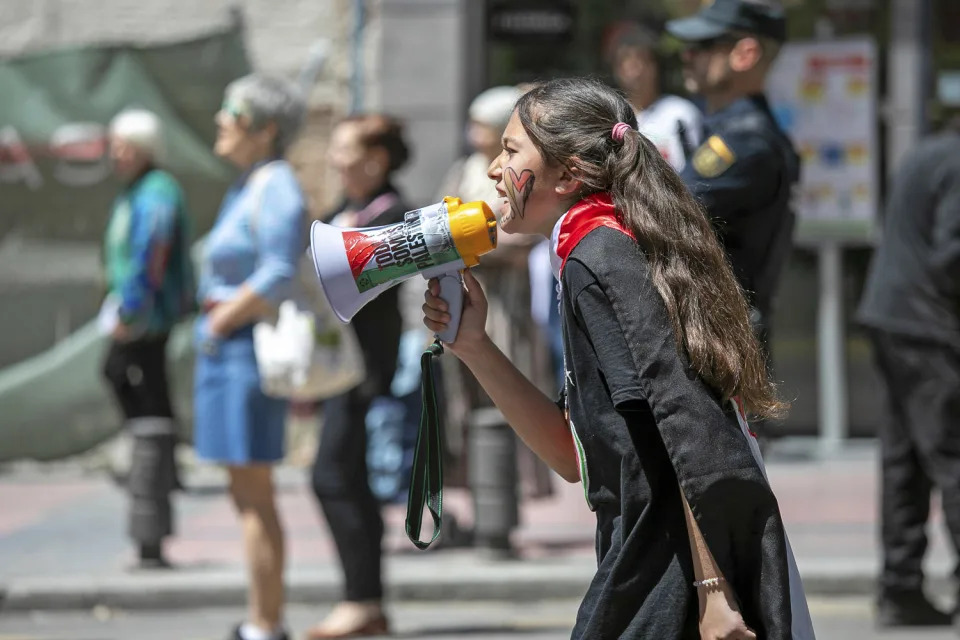
Pro-Palestinian demonstration in Madrid (David Canales / Sipa USA via AP)
Over the weekend, crowds gathered in cities around the world, including in the U.S., the U.K., the Netherlands, Australia, New Zealand, Canada and Ireland. Protesters marched with Palestinian flags and signs calling for a cease-fire in Gaza, as well as for displaced Palestinians’ right to return to their homes.
Additional protests in more countries, like Wales, Germany and Belgium, are planned for this week.
U.S.
In Brooklyn, New York, hundreds of people gathered at the Barclays Center on Saturday to call for an end to what many believe is a genocide in Gaza, as well as to call on the U.S. to stop sending weapons to Israel.

Pro-Palestinian demonstrators outside Barclays Center in Brooklyn, N.Y., on May 11, 2024. (Alex Kent / Getty Images)
The U.S. is still sending weapons to Israel despite stopping an arms shipment of 2,000-pound and 500-pound bombs to the country last week over Prime Minister Benjamin Netanyahu's plans for a full-scale invasion of Rafah.
Protesters chanted, "We want justice. You know how? Stop bombing Rafah now." Some brought drums, which they played along with protest chants.
New York City Police Department officers in riot gear were seen closing in on protesters at one point and arresting them. More than 160 people were taken into custody over the course of the protest, according to the NYPD.
Hamed Yaghi and Souad Yaghi, a brother and sister from Connecticut, came to the Brooklyn protest to honor the victims of the Nakba, which they say not many people know about.
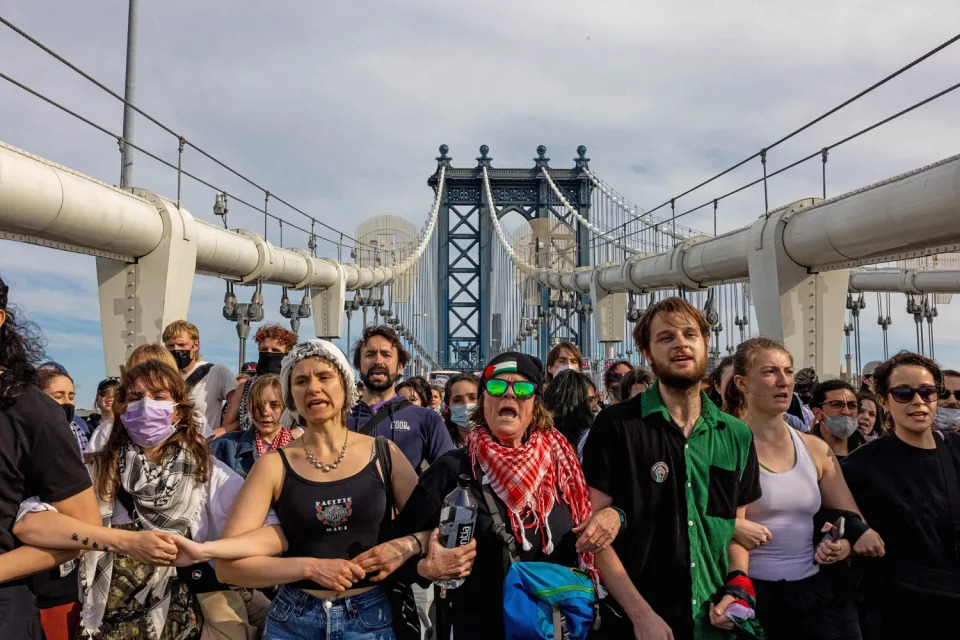
Pro-Palestinian demonstrators join arms as they block traffic on the Manhattan Bridge. (Alex Kent / Getty Images)
"We hope that everyone that sees the protest tries to research the history of Palestine," 20-year-old Hamed Yaghi told NBC News.
Elsewhere in New York, protesters blocked traffic on the Manhattan Bridge on Saturday.
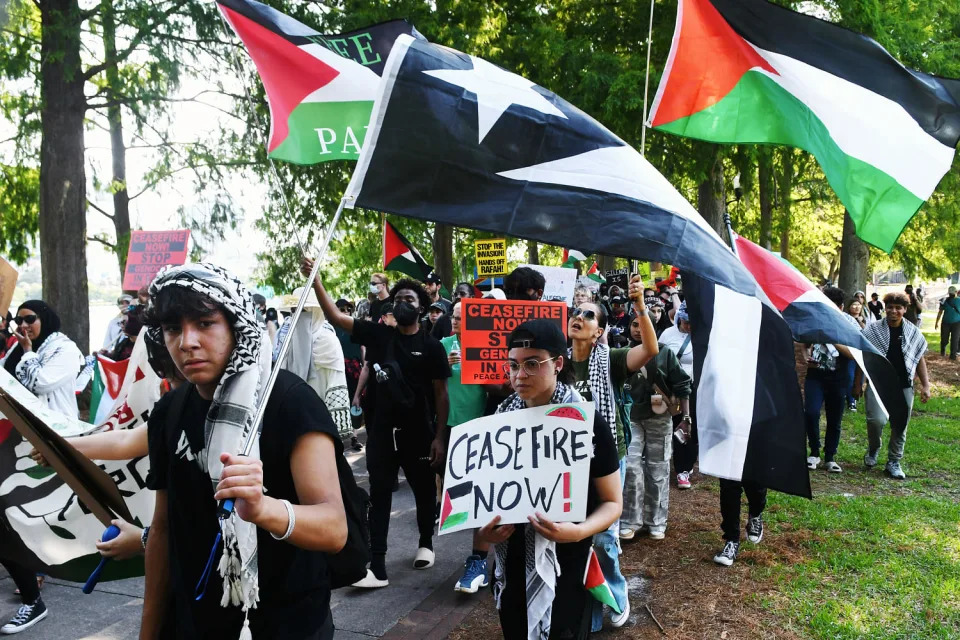
Pro-Palestinian protest to commemorate Nakba Day in Orlando (Paul Hennessy / Anadolu via Getty Images)
In Seattle, protesters gathered to commemorate the Nakba at Westlake Park. In videos circulating online, protesters are heard chanting, "Hey hey, ho ho, the occupation has got to go."
U.K.
Protesters were seen in multiple cities in the United Kingdom on Saturday, including Bristol and London.
In Bristol, protesters carried signs that read, "Free Palestine."

Pro-Palestinian Protest London (Kristian Buus / In Pictures via Getty Images)
Protesters wearing and waving Palestinian flags also gathered in Northamptonshire on Saturday.
Another protest commemorating the 76th anniversary of the Nakba is planned in central London this Saturday.
Canada
Hundreds of protesters could be seen in Montreal at Westmount Square on Saturday calling for a cease-fire in Gaza.

Pro-Palestinian demonstration in Toronto (Mert Alper Dervis/= / Anadolu via Getty Images)
A few protesters held a banner that read, "Injustice anywhere is a threat to justice everywhere."
A large gathering of protesters was also seen in Toronto near the U.S. Consulate.
Australia
On Sunday, protesters gathered in Melbourne at State Library Victoria.

Pro-Palestinian marchers in Melbourne, Australia. (@MixtUpMixy via X)
One protester held a sign in support of health care workers in Gaza that read, "YOU ARE NOT ALONE."
The Netherlands
In Amsterdam, protesters held a large Palestinian flag in the city center, video posted on social media showed.

Pro-Palestinians rally in the center of Amsterdam on May 11, 2024. (Ana Fernandez / Sipa USA via AP)
"10.000 against the settler colonial state and the ethnic cleansing of Palestine," one protester wrote in a caption on X accompanying the video.
New Zealand
Supporters of Palestinians were seen in New Plymouth on Sunday carrying a sign that read, "STOP THE GENOCIDE."

A
Also on Sunday in Auckland, protesters gathered at Aotea Square with instruments including drums and saxophones called for a "free Palestine."
Ireland
A small group of protesters in Fingal chanted "Free, free Palestine" over the weekend in a video shared by local politician John Burtchaell.

A small group of pro-Palestinian protesters in Fingal County, Ireland (John Burtchaell)
One protester held a sign that read, “Hands off Rafah.”
This article was originally published on NBCNews.com
Palestinians mark 1948 Nakba in anger at Gaza war
Reuters Video TRANSCRIPT
Updated Wed, May 15, 2024
STORY: Peace signs and a minute's silence: Palestinians and their supporters around the world commemorated the 1948 "Nakba" or catastrophe on Wednesday (March 15) in the shadow of war in Gaza.
These keys symbolize the homes hundreds of thousands of dispossessed Palestinians lost in the war when Israel was founded.
The Nakba has been a defining experience for Palestinians for more than 75 years, helping to shape their national identity.
Eighty year-old Umm Mohammed survived the original Nakba as a child.
After losing her home in the latest war like nearly all Gazans, she shelters in a tent in the southern city of Rafah, where Israeli tanks are massed on the eastern edges ahead of a feared offensive.
"There is no catastrophe worse than this one. I've been here for about 80 years and a catastrophe like this, I have not seen. Our homes have gone, our children have gone, our property has gone, our gold has gone, our incomes have gone - nothing is left. What is left for us to cry over?"
The seven-month-old Israeli campaign has reduced much of the Gaza Strip to rubble and killed more than 35,000 Palestinians, according to Gaza's health ministry.
Many Gazans fear being driven from the enclave in a second Nakba.
"It's been a Nakba for the past 76 years, it's not new, we have many other catastrophes in villages and the most recent of them is the Nakba we see in Gaza."
The May 15 Nakba day commemoration marks the start of the 1948 war, when neighboring Arab states invaded a day after the Israel declared its independence following the withdrawal of British forces from what was then called Palestine.
The fighting lasted for months and cost thousands of lives.
Descendants of the Palestinians who remained in Israel call for their kin to be allowed to return, something Israel rejects.
Daya Dan, an activist from the Israeli city of Haifa, marched with them.
“I'm here to show solidarity with my Palestinian brothers and sisters and to protest the right to return to their stolen lands.”
Nearly 6 million Palestinians are currently registered as refugees in the West Bank, the Gaza Strip, Jordan, Lebanon and Syria, according to the United Nations, in addition to populations scattered across the world.
The Solemn History Behind Nakba Day
Juwayriah Wright
Wed, May 15, 2024
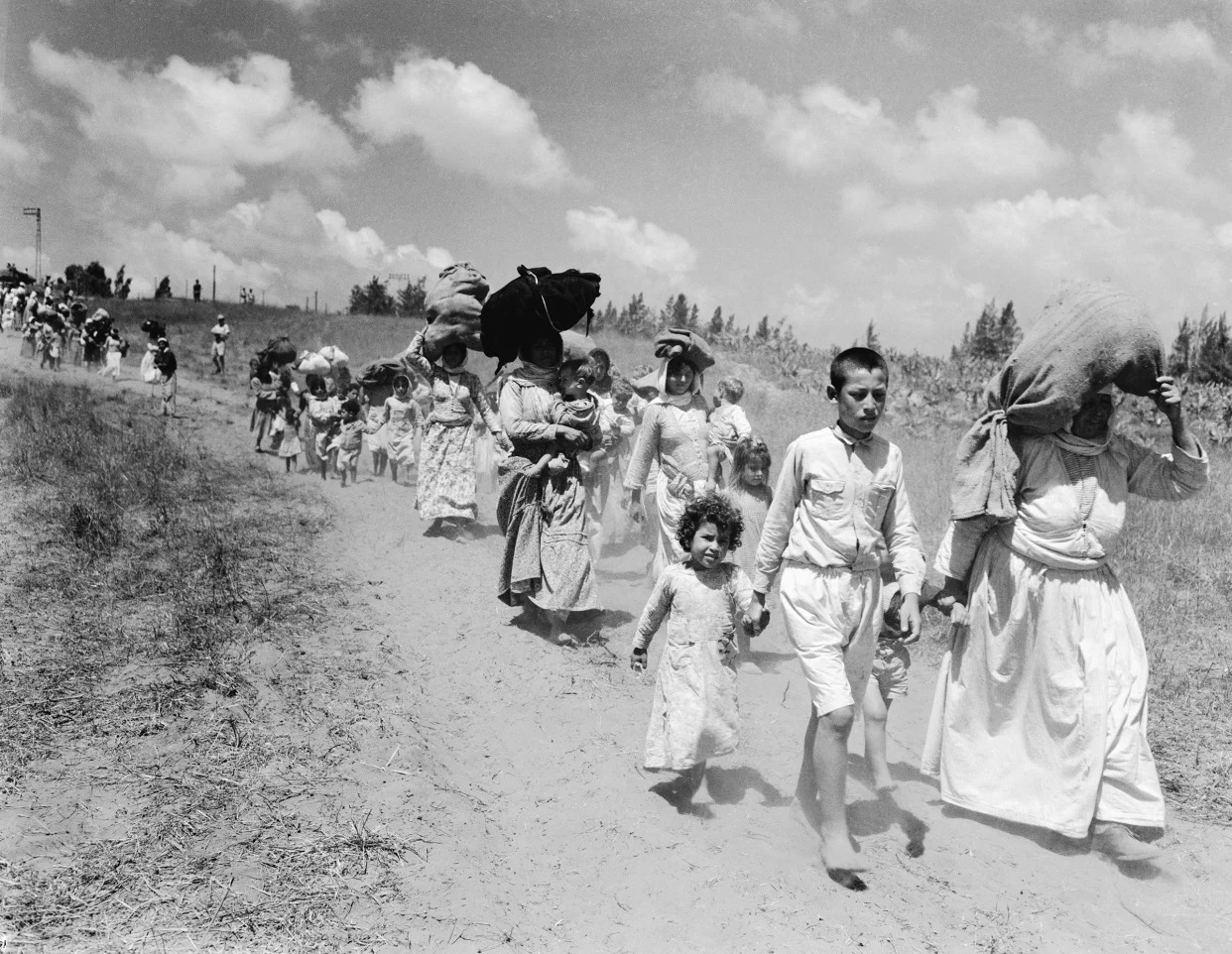
Arab refugees, mostly women and children, from a village near Haifa begin a three mile hike carrying large bundles of personal possessions to the Arab lines in Tulkarim, West Bank, on June 26, 1948. Credit - Bettmann Archive/Getty Images
Every year on May 15, Palestinian people across the world observe what is known as Nakba Day, the solemn anniversary of the day in 1948 when the Arab-Israeli War began, precipitating a wave of displacement and expulsion among the Palestinian population. This year, with more than 450,000 people—nearly a quarter of Gaza’s population—newly displaced in just the past week, the commemoration of the Nakba, Arabic for “catastrophe,” takes on new significance.
For those who observe it, Nakba Day is not only a day for mourning, but for a sense of re-establishment. Although it is annually remembered, the event has historical nuances and driving forces that can contribute to an understanding of the current events in Gaza.
What is commemorated on Nakba Day?
Political Zionism—the movement to create a Jewish state—dates back to the 19th century, but the persecution of Jewish people in Europe in the 1930s and the horrors of the Holocaust drove a massive migration in that decade of 60,000 Jews to what was then known as Mandatory Palestine, the British-controlled land that was majority Muslim-Palestinian at the time. In the midst of increasing conflict over the land, the United Nations proposed a division of Arab and Jewish states; the proposal was opposed by the Arab population of the land, and a civil war followed the announcement of the plan. When Israel declared its independence on May 14, 1948, following Britain’s departure, armies from several neighboring Arab lands joined the war on the side of the Palestinian Arab population. Their invasion took place on May 15.
Read More: Why the Director of Netflix’s Farha Depicted the Murder of a Palestinian Family
In the war that followed, as Israel pushed back the forces of its neighbors, over half the Palestinian population was displaced. From 1947 to 1949, 531 towns were destroyed by Israeli militias, according to the West Bank-based Palestinian Central Bureau of Statistics, homes were shelled, and 15,000 people were killed, including women and children. “They witnessed rapes, imprisonment of men and boys, and almost all of them witnessed the destruction of major cultural sites,” says professor Abdel Razzaq Takriti, who teaches modern Palestinian and Arabic History at Rice University. (By the end of the Arab-Israeli war, over 6,000 Israelis lost their lives, including some in mass killings.)
“There were attacks on water sources; Akka [also known as Acre], for example, was subjected to biological warfare. Their water was poisoned to try to force the populations out,” Takriti says. “The idea was to have as much land appropriated with the fewest Palestinian population remaining as possible.” Further attempts to poison water supplies in Gaza were thwarted when Egyptian officials found out, says Takriti.
Of the 1.4 million-strong Palestinian population at the time, 800,000 were displaced; the massacres of families and towns left enduring scars on the survivors. “The Nakba has two dimensions,” Takriti says. “The humanitarian catastrophe entails loss of land, loss of property and expulsion of the people. The other dimension was the political catastrophe, which entailed suppression of native sovereignty. Those two aspects of reality continue to this very day”
Razan Ghabin, a 26-year-old Palestinian living in the U.S., recounts the stories told to her by her grandparents who survived the Nakba. Ghabin’s grandmother, Othmana As'ad Ghabin, was a Palestinian refugee from Lifta, a village on the outskirts of Jerusalem. Born in 1925, Othmana recounted the Nakba to her granddaughter many times. She would test her children and grandchildren by having them repeating her memories back to her to ensure that her stories never died. The Liftawi people were affluent, with many of the relatives in the families holding Master’s degrees. Lifta is now known as “Palestinian Pompeii”–the original buildings left behind after the Nakba still stand today, deserted.
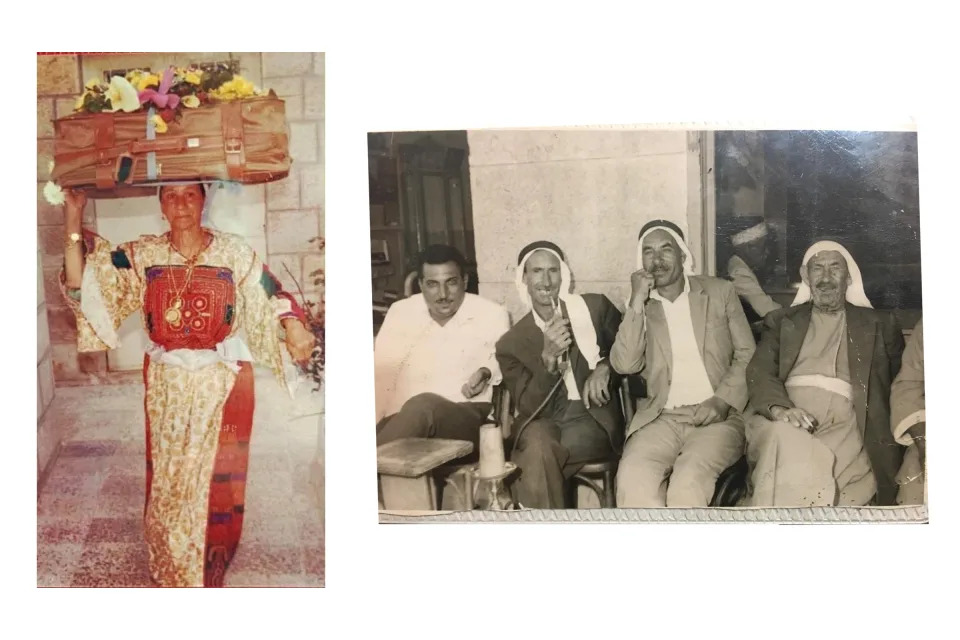
Left: Razan Ghabin’s grandmother, Othmana As’ad Ghabin, wearing a traditional Liftawi thobe celebrating the wedding of one of her children in Ramallah, Palestine years after the Nakba; Right: Ghabin's great-grandparents and relatives outside a Lifta coffee shop years before the Nakba, where they would eventually be attacked and forcibly removed.Courtesy GhabinMore
Israeli militia attacked a coffee shop in the village in 1948 while Othmana’s family were there, she says. The military threatened them and told them to leave, telling them it would be temporary. They hid in a nearby cave and any time they tried to return they’d be shot at. They later had to establish a life as refugees in Ramallah, a city in the West Bank. Even though the borders opened years later in 1967, As’ad was never able to return to Lifta. The family continues to live in Ramallah.
How is Nakba Day commemorated today?
Yousef Kassim, a Palestinian-American and son of Nakba survivors, emphasized the importance of the day for Palestinians worldwide. “We certainly reflect on it as a family; we’ll share stories or my dad will share stories. He was a baby when it actually happened, but less and less people that were alive when it happened are still here. For a lot of them it’s tough to talk about,” Kassim says. “We believe it’s still ongoing, because so long as the Palestinians that were expelled and their descendants aren't allowed to return, it’s ongoing for them.”
Read More: Imagining a Free Palestine
“My father was from Lifta, next to Deir Yassin”—the site of one of the most infamous massacres of the Nakba—“and that’s where my paternal grandmother was born,” he says. “News spread quick to the neighboring villages, news of the murders and rapes.” Village residents were not in a position to fend off the military. Kassim’s grandfather rented houses to Holocaust survivors and Jewish immigrants, and after what happened to his family, was left penniless with 12 kids. Yousef Kassim’s family lived only six miles outside of Lifta but was never allowed to return. “He lived until he was 93 years old and never got to see justice.”
Palestinian right of return groups and committees across the world demand rights during this day, recounting the destruction of their individual towns and cities, says Takriti. “The refugees want a repatriation, and vehemently reject the resettlement and want their land back. They also want an end to the military occupation and Israeli apartheid systems.” Many Palestinians demand political, national, and humanitarian respect during this time, and they do this through marches, rallies, speeches, publications and cultural activities.
“A lot of Palestinians, when we think of the Nakba we think of really horrible events,” Kassim says, “but we also gain a lot of inspiration from the way that our parents and grandparents approached really difficult situations with a lot of grace.”
Palestinians in Israel demand refugee return on 'Nakba' anniversary
Tue, May 14, 2024

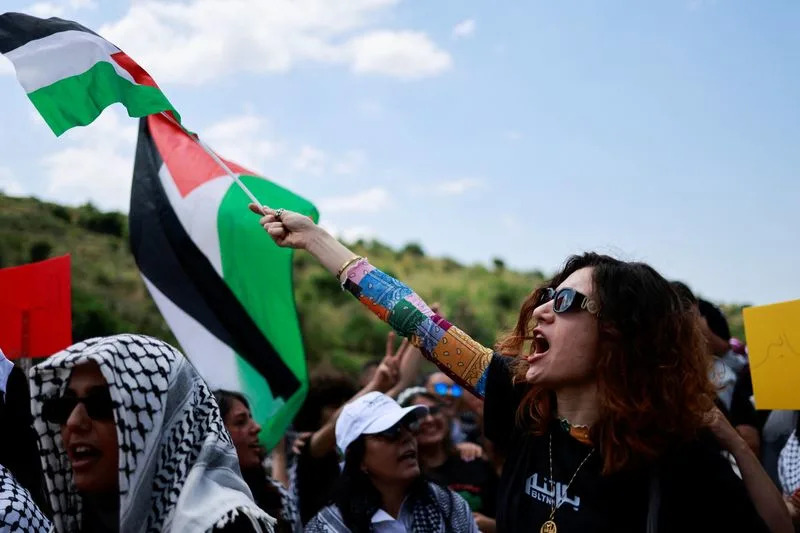
By Henriette Chacar
NEAR HAIFA, Israel (Reuters) - Thousands of flag-waving Palestinians marched in northern Israel on Tuesday to commemorate the flight and forced flight of Palestinians during the 1948 war surrounding Israel's creation, and to demand the right of refugees to return.
Many of the about 3,000 people also called for an end to the war in Gaza as they took part in the march near the city of Haifa marking the "Nakba", or "catastrophe", when hundreds of thousands of Palestinians fled or were driven out during the 1948 war that accompanied Israel's creation.
Many held up Palestinian flags and wore keffiyeh head scarves during the annual Return March, a rare Palestinian demonstration permitted to go ahead in Israel as the war in the Gaza Strip rages on.
Many clutched water bottles, and some pushed strollers, as they marched along a dirt path. One person held aloft half a watermelon, which became a Palestinian symbol after Israeli bans on the flag because of its red, green and black colours. Others called for Palestinians to be freed from Israeli occupation.
"This is part of our liberation," said Fidaa Shehadeh, coordinator of the Women Against Weapons Coalition and former member of the Lydd Municipality Council. "It's not only about ending the occupation but also about allowing all refugees the ability to return to the homeland."
Some 700,000 Palestinians left or were forced to flee their homes during the 1948 war. Shehadeh said her family was forcibly displaced from the coastal village of Majdal Asqalan, with some fleeing to the city of Lydd in what became Israel and others to Gaza. She considered herself an internally displaced person.
She said "refugees remain refugees" 76 years later.
Shehadeh said her uncles and aunts in Gaza, whom she said she was last able to visit in 2008 with Israeli approval, are now displaced again as they try to escape Israel's bombardment.
They do not know if or when they will be able to return to their homes, she said.
Shehadeh said she travels to the West Bank almost weekly to top up e-SIMs for her Gaza relatives so that they can remain in contact.
"Sometimes we wait for days to receive a 'good morning' message, that's how we know whoever sent it is still alive," she said.
Over 35,000 Palestinians have been killed in the Gaza war, Gaza health officials say. Israel began its offensive in Gaza, which is governed by Hamas, after the Oct. 7 raid led by gunmen from the Islamist militant group in which 1,200 people were killed in Israel and 253 abducted, according to Israeli tallies.
ARABS IN ISRAEL
Arabs make up about a fifth of Israel's population. They hold Israeli citizenship while many identify with Palestinians in the occupied West Bank, East Jerusalem and Gaza.
Every year, participants of the march, among them descendants of Palestinians who were internally displaced during the 1948 war, visit a different village that was destroyed or depopulated by Zionist militias.
Israel rejects the Palestinian right of return as a demographic threat to a country it describes as the nation-state of the Jewish people. It has said Palestinian refugees must settle in their host countries or in a future Palestinian state.
Kareem Ali, 12, held a sign reading "My grandparents lived in Kasayir" as he marched beside his father, Hamdan, referring to one of the villages being remembered this year. The family now resides in Shefa'amr in northern Israel.
For many years, Hamdan's father, a farmer, would pass by the depopulated village and pick figs from a tree that remained, Hamdan said.
"Our memory is our power," he said.
Some Arab citizens say they have experienced increased hostility during the Gaza war, with hundreds facing criminal proceedings, disciplinary hearings and expulsions from universities or jobs, Haifa-based rights group Adalah says.
Israeli police have said they are combating incitement to violence.
BADIL, a Bethlehem-based organisation advocating for refugee rights, estimated that by the end of 2021 some 65% of 14 million Palestinians globally were forcibly displaced persons, including
refugees and citizens of Israel who were internally displaced.
Some 5.9 million people are registered with the U.N. agency for Palestinian refugees (UNRWA). Most people in Gaza are refugees.
(Reporting by Henriette Chacar; Editing by Timothy Heritage)
Palestinians say Gaza war like enduring a second 'Nakba'
AFP
Wed, May 15, 2024
As the Gaza war raged on, Palestinians on Wednesday marked the anniversary of the Nakba, or "catastrophe", of mass displacement during the creation of the state of Israel 76 years ago.
Thousands marched in cities across the Israeli-occupied West Bank, waving Palestinian flags, wearing keffiyeh scarves and holding up symbolic keys as reminders of long-lost family homes.
Inside the besieged Gaza Strip, where the Israel-Hamas war has ground on for more than seven months, scores more died in the fighting sparked by the Hamas attack of October 7.
"Our 'Nakba' in 2023 is the worst ever," said one displaced Gaza man, Mohammed al-Farra, whose family fled their home in Khan Yunis for the coastal area of Al-Mawasi.
"It is much harder than the Nakba of 1948."
Palestinians everywhere have long mourned the events of that year when, during the war that led to the establishment of Israel, around 760,000 Palestinians fled or were driven from their homes.
But 42-year-old Farra, whose family was then displaced from Jaffa near Tel Aviv, said the current war is even harder.
"When your child is accustomed to all the comforts and luxuries, and suddenly, overnight, everything is taken away from him... it is a big shock."
- West Bank rallies -
Thousands marched in the West Bank city of Ramallah, as well as in Nablus, Hebron and elsewhere, carrying banners denouncing the occupation and protesting the war in Gaza.
"There's pain for us, but of course more pain for Gazans," said one protester, Manal Sarhan, 53, who has relatives in Israeli jails that have not been heard from since October 7.
"We're living the Nakba a second time."
Wednesday's commemorations and marches -- held a day after Israel's Independence Day -- come as the Gaza war has brought a massive death toll and the forced displaced of most of the territory's 2.4 million people.
A devastating humanitarian crisis has plagued the territory, with the United Nations warning of looming famine in the north.
Ahmed al-Akhras, 50, who was displaced from central Gaza to Rafah in the far south, also said the war was worse than anything Palestinians have endured before.
"Through my experience and conversations with those who lived through the Nakba... the bombings, destruction, displacement, killing and annihilation occurring in this war are unprecedented throughout history," he said.
By comparison, he said, back in 1948 -- when his own family fled the destroyed village of Wadi Hunayn in what is now Israel -- for most people "the suffering was limited to forced displacement".
- 'We're not free' -
The bloodiest-ever Gaza war erupted after Hamas's October 7 attack on Israel, which killed more than 1,170 people, mostly civilians, according to an AFP tally of Israeli official figures.
Militants also seized about 250 hostages, 128 of whom Israel estimates remain in Gaza, including 36 the military says are dead.
Israel's relentless bombardment and ground offensive in Gaza have since killed at least 35,233 people, mostly civilians, according to the Gaza health ministry.
With the Middle East peace process stalled for many years already, enmity between Israel's leadership and Palestinian factions has reached fever pitch, while the conflict has also sparked a global wave of pro-Palestinian demonstrations.
At the Ramallah rally, 16-year-old Ahmed Nomas said: "We want the world to stop seeing Palestinians as terrorists and to realise that we have no rights."
"We are not free to move," said Nomas, whose family has lived in the West Bank refugee camp of Qalandia since they were ousted from their village near Jerusalem in 1948.
"The Israeli soldiers are always checking or monitoring our movements. It's not a life."
The West Bank has been occupied by Israel since 1967 and is home to about 490,000 Israeli settlers who live in communities considered illegal under international law.
Violence has surged since October 7, with at least 499 Palestinians killed, according to the health ministry, and at least 20 Israelis dead according to an AFP tally based on official Israeli figures.
As on many others days, Palestinians mourned a violent death on Wednesday -- a young man officials said was shot dead by Israeli forces during an altercation following the Nakba rally in Ramallah.
The army did not immediately comment on the death of the man, identified as Ayser Muhammad Safi, 20, a student at Birzeit University, by the Palestinian news agency Wafa.
As his bloodied body, wrapped in a blue sheet, was taken to a morgue, tearful onlookers screamed and chanted "Allahu akbar", or God is greatest, and one young woman fainted.
str-al-ysm/jd/fz/dv
Palestinians mark 76 years of dispossession as a potentially even larger catastrophe unfolds in Gaza
JOSEPH KRAUSS
Updated Tue, May 14, 2024
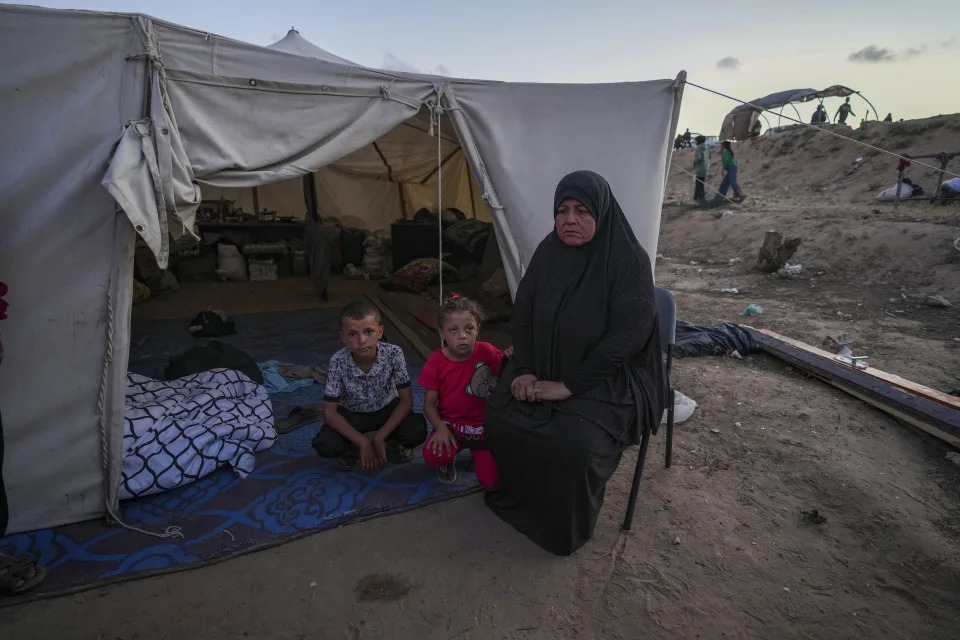
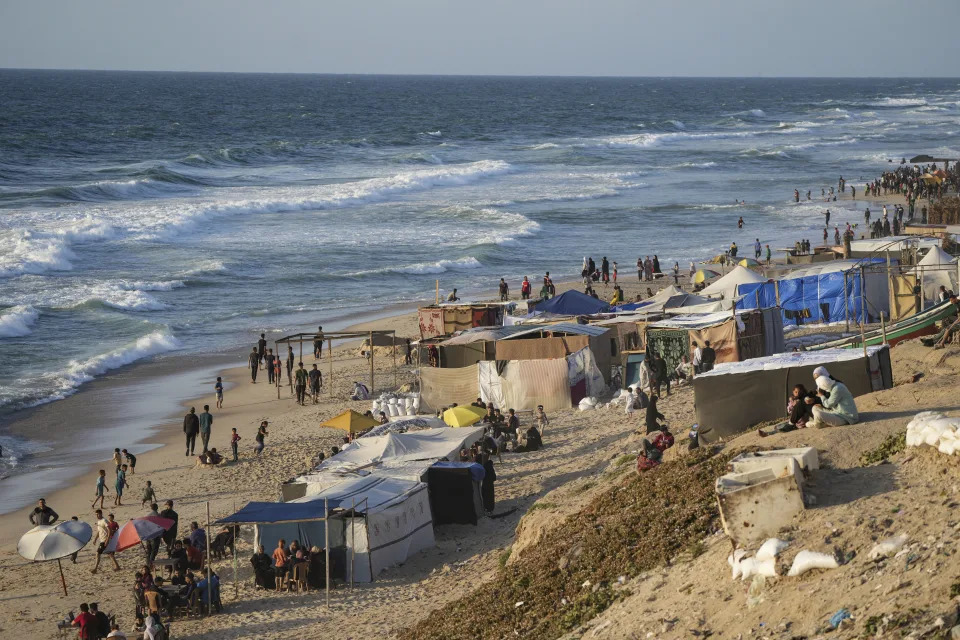

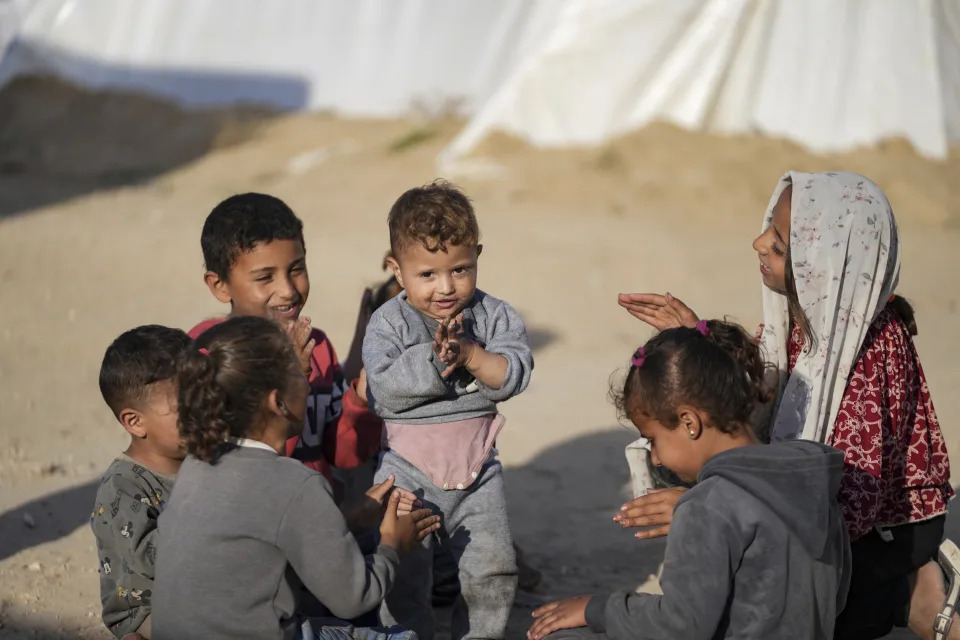
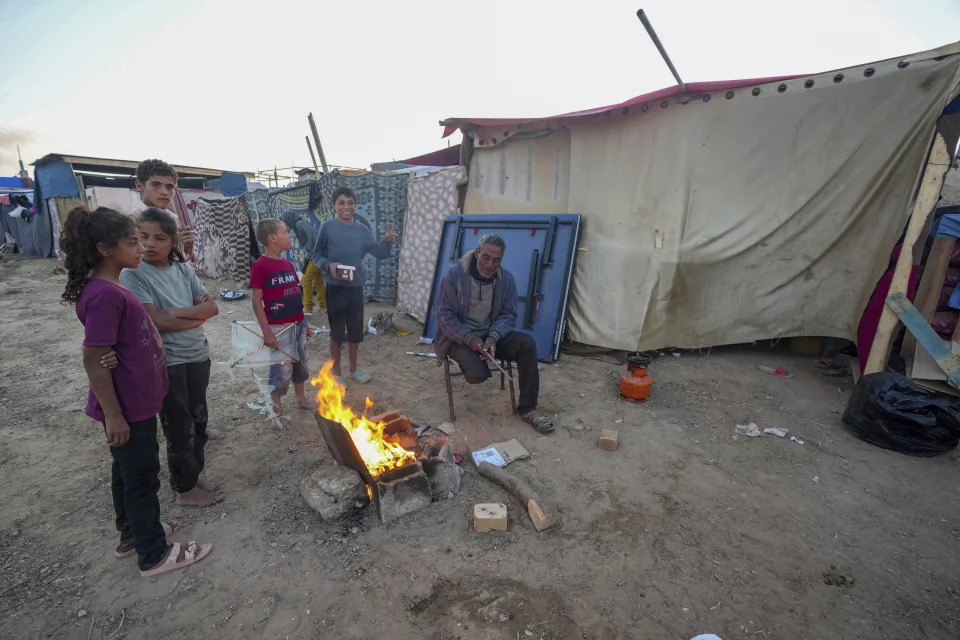

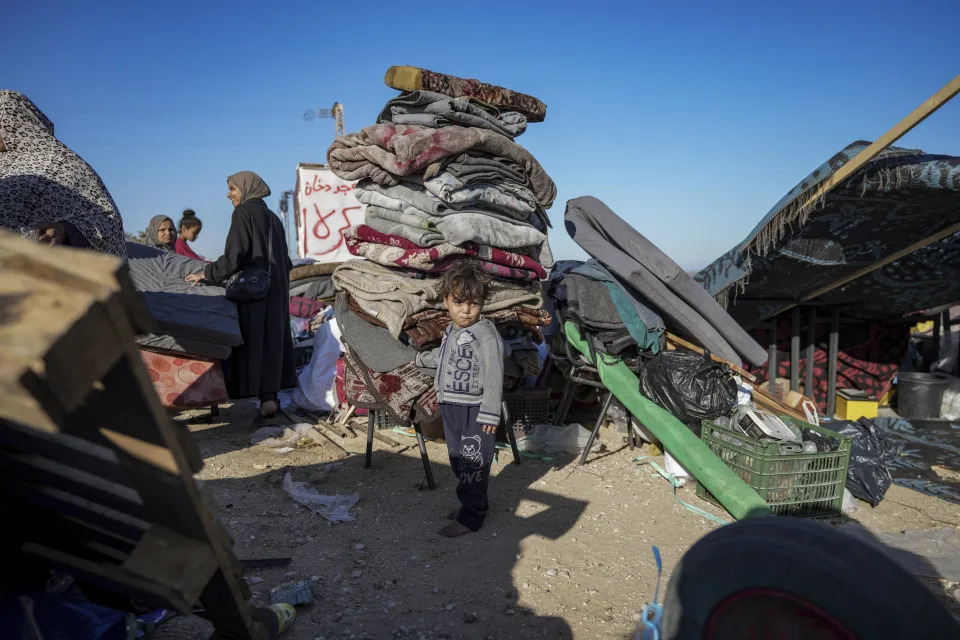
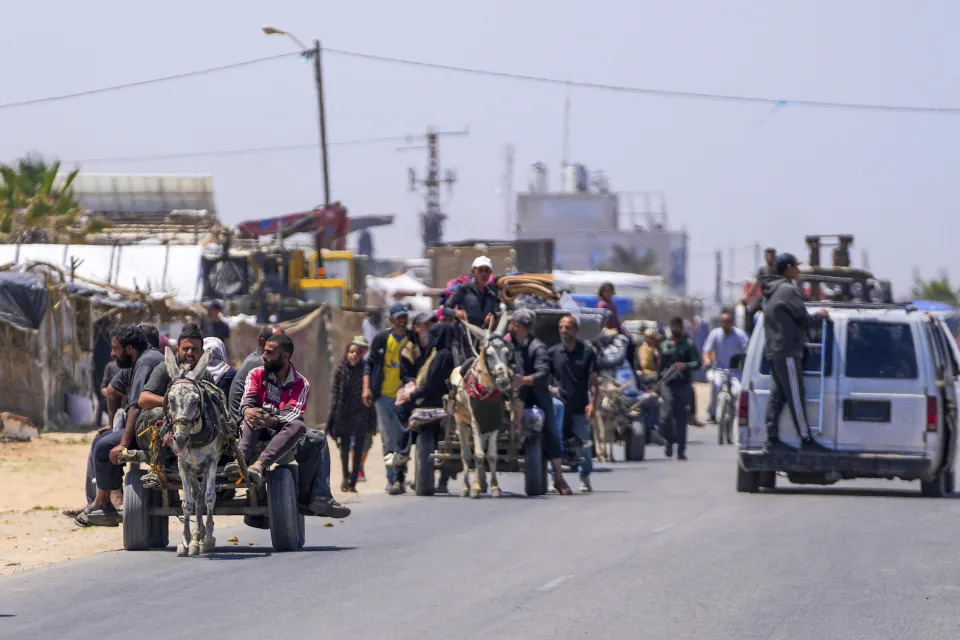


Displaced Palestinians arrive in central Gaza after fleeing from the southern Gaza city of Rafah in Deir al Balah, Gaza Strip, on Thursday, May 9, 2024. Palestinians on Wednesday, May 15, 2024, will mark the 76th year of their mass expulsion from what is now Israel. It’s an event that is at the core of their national struggle, but in many ways pales in comparison to the calamity now unfolding in Gaza.
(AP Photo/Abdel Kareem Hana, File)
JERUSALEM (AP) — Palestinians on Wednesday will mark the 76th year of their mass expulsion from what is now Israel, an event that is at the core of their national struggle. But in many ways, that experience pales in comparison to the calamity now unfolding in Gaza.
Palestinians refer to it as the Nakba, Arabic for catastrophe. Some 700,000 Palestinians — a majority of the prewar population — fled or were driven from their homes before and during the 1948 Arab-Israeli war that followed Israel's establishment.
After the war, Israel refused to allow them to return because it would have resulted in a Palestinian majority within its borders. Instead, they became a seemingly permanent refugee community that now numbers some 6 million, with most living in slum-like urban refugee camps in Lebanon, Syria, Jordan and the Israeli-occupied West Bank.
In Gaza, the refugees and their descendants make up around three-quarters of the population.
Israel's rejection of what Palestinians say is their right of return has been a core grievance in the conflict and was one of the thorniest issues in peace talks that last collapsed 15 years ago. The refugee camps have always been the main bastions of Palestinian militancy.
Now, many Palestinians fear a repeat of their painful history on an even more cataclysmic scale.
All across Gaza, Palestinians in recent days have been loading up cars and donkey carts or setting out on foot to already overcrowded tent camps as Israel expands its offensive. The images from several rounds of mass evacuations throughout the seven-month war are strikingly similar to black-and-white photographs from 1948.
Mustafa al-Gazzar, now 81, still recalls his family's monthslong flight from their village in what is now central Israel to the southern city of Rafah, when he was 5. At one point they were bombed from the air, at another, they dug holes under a tree to sleep in for warmth.
Al-Gazzar, now a great-grandfather, was forced to flee again over the weekend, this time to a tent in Muwasi, a barren coastal area where some 450,000 Palestinians live in a squalid camp. He says the conditions are worse than in 1948, when the U.N. agency for Palestinian refugees was able to regularly provide food and other essentials.
“My hope in 1948 was to return, but my hope today is to survive,” he said. “I live in such fear,” he added, breaking into tears. “I cannot provide for my children and grandchildren.”
The war in Gaza, which was triggered by Hamas' Oct. 7 attack into Israel, has killed over 35,000 Palestinians, according to local health officials, making it by far the deadliest round of fighting in the history of the conflict. The initial Hamas attack killed some 1,200 Israelis.
The war has forced some 1.7 million Palestinians — around three quarters of the territory's population — to flee their homes, often multiple times. That is well over twice the number that fled before and during the 1948 war.
Israel has sealed its border. Egypt has only allowed a small number of Palestinians to leave, in part because it fears a mass influx of Palestinians could generate another long-term refugee crisis.
The international community is strongly opposed to any mass expulsion of Palestinians from Gaza — an idea embraced by far-right members of the Israeli government, who refer to it as “voluntary emigration.”
Israel has long called for the refugees of 1948 to be absorbed into host countries, saying that calls for their return are unrealistic and would endanger its existence as a Jewish-majority state. It points to the hundreds of thousands of Jews who came to Israel from Arab countries during the turmoil following its establishment, though few of them want to return.
Even if Palestinians are not expelled from Gaza en masse, many fear that they will never be able to return to their homes or that the destruction wreaked on the territory will make it impossible to live there. A recent U.N. estimate said it would take until 2040 to rebuild destroyed homes.
The Jewish militias in the 1948 war with the armies of neighboring Arab nations were mainly armed with lighter weapons like rifles, machine guns and mortars. Hundreds of depopulated Palestinian villages were demolished after the war, while Israelis moved into Palestinian homes in Jerusalem, Jaffa and other cities.
In Gaza, Israel has unleashed one of the deadliest and most destructive military campaigns in recent history, at times dropping 2,000-pound (900-kilogram) bombs on dense, residential areas. Entire neighborhoods have been reduced to wastelands of rubble and plowed-up roads, many littered with unexploded bombs.
The World Bank estimates that $18.5 billion in damage has been inflicted on Gaza, roughly equivalent to the gross domestic product of the entire Palestinian territories in 2022. And that was in January, in the early days of Israel’s devastating ground operations in Khan Younis and before it went into Rafah.
Yara Asi, a Palestinian assistant professor at the University of Central Florida who has done research on the damage to civilian infrastructure in the war, says it's “extremely difficult” to imagine the kind of international effort that would be necessary to rebuild Gaza.
Even before the war, many Palestinians spoke of an ongoing Nakba, in which Israel gradually forces them out of Gaza, the West Bank and east Jerusalem, territories it captured during the 1967 war that the Palestinians want for a future state. They point to home demolitions, settlement construction and other discriminatory policies that long predate the war, and which major rights groups say amount to apartheid, allegations Israel denies.
Asi and others fear that if another genuine Nakba occurs, it will be in the form of a gradual departure.
“It won’t be called forcible displacement in some cases. It will be called emigration, it will be called something else," Asi said.
"But in essence, it is people who wish to stay, who have done everything in their power to stay for generations in impossible conditions, finally reaching a point where life is just not livable.”
___
Associated Press journalists Wafaa Shurafa and Mohammad Jahjouh in Rafah, Gaza Strip, contributed.
___
JERUSALEM (AP) — Palestinians on Wednesday will mark the 76th year of their mass expulsion from what is now Israel, an event that is at the core of their national struggle. But in many ways, that experience pales in comparison to the calamity now unfolding in Gaza.
Palestinians refer to it as the Nakba, Arabic for catastrophe. Some 700,000 Palestinians — a majority of the prewar population — fled or were driven from their homes before and during the 1948 Arab-Israeli war that followed Israel's establishment.
After the war, Israel refused to allow them to return because it would have resulted in a Palestinian majority within its borders. Instead, they became a seemingly permanent refugee community that now numbers some 6 million, with most living in slum-like urban refugee camps in Lebanon, Syria, Jordan and the Israeli-occupied West Bank.
In Gaza, the refugees and their descendants make up around three-quarters of the population.
Israel's rejection of what Palestinians say is their right of return has been a core grievance in the conflict and was one of the thorniest issues in peace talks that last collapsed 15 years ago. The refugee camps have always been the main bastions of Palestinian militancy.
Now, many Palestinians fear a repeat of their painful history on an even more cataclysmic scale.
All across Gaza, Palestinians in recent days have been loading up cars and donkey carts or setting out on foot to already overcrowded tent camps as Israel expands its offensive. The images from several rounds of mass evacuations throughout the seven-month war are strikingly similar to black-and-white photographs from 1948.
Mustafa al-Gazzar, now 81, still recalls his family's monthslong flight from their village in what is now central Israel to the southern city of Rafah, when he was 5. At one point they were bombed from the air, at another, they dug holes under a tree to sleep in for warmth.
Al-Gazzar, now a great-grandfather, was forced to flee again over the weekend, this time to a tent in Muwasi, a barren coastal area where some 450,000 Palestinians live in a squalid camp. He says the conditions are worse than in 1948, when the U.N. agency for Palestinian refugees was able to regularly provide food and other essentials.
“My hope in 1948 was to return, but my hope today is to survive,” he said. “I live in such fear,” he added, breaking into tears. “I cannot provide for my children and grandchildren.”
The war in Gaza, which was triggered by Hamas' Oct. 7 attack into Israel, has killed over 35,000 Palestinians, according to local health officials, making it by far the deadliest round of fighting in the history of the conflict. The initial Hamas attack killed some 1,200 Israelis.
The war has forced some 1.7 million Palestinians — around three quarters of the territory's population — to flee their homes, often multiple times. That is well over twice the number that fled before and during the 1948 war.
Israel has sealed its border. Egypt has only allowed a small number of Palestinians to leave, in part because it fears a mass influx of Palestinians could generate another long-term refugee crisis.
The international community is strongly opposed to any mass expulsion of Palestinians from Gaza — an idea embraced by far-right members of the Israeli government, who refer to it as “voluntary emigration.”
Israel has long called for the refugees of 1948 to be absorbed into host countries, saying that calls for their return are unrealistic and would endanger its existence as a Jewish-majority state. It points to the hundreds of thousands of Jews who came to Israel from Arab countries during the turmoil following its establishment, though few of them want to return.
Even if Palestinians are not expelled from Gaza en masse, many fear that they will never be able to return to their homes or that the destruction wreaked on the territory will make it impossible to live there. A recent U.N. estimate said it would take until 2040 to rebuild destroyed homes.
The Jewish militias in the 1948 war with the armies of neighboring Arab nations were mainly armed with lighter weapons like rifles, machine guns and mortars. Hundreds of depopulated Palestinian villages were demolished after the war, while Israelis moved into Palestinian homes in Jerusalem, Jaffa and other cities.
In Gaza, Israel has unleashed one of the deadliest and most destructive military campaigns in recent history, at times dropping 2,000-pound (900-kilogram) bombs on dense, residential areas. Entire neighborhoods have been reduced to wastelands of rubble and plowed-up roads, many littered with unexploded bombs.
The World Bank estimates that $18.5 billion in damage has been inflicted on Gaza, roughly equivalent to the gross domestic product of the entire Palestinian territories in 2022. And that was in January, in the early days of Israel’s devastating ground operations in Khan Younis and before it went into Rafah.
Yara Asi, a Palestinian assistant professor at the University of Central Florida who has done research on the damage to civilian infrastructure in the war, says it's “extremely difficult” to imagine the kind of international effort that would be necessary to rebuild Gaza.
Even before the war, many Palestinians spoke of an ongoing Nakba, in which Israel gradually forces them out of Gaza, the West Bank and east Jerusalem, territories it captured during the 1967 war that the Palestinians want for a future state. They point to home demolitions, settlement construction and other discriminatory policies that long predate the war, and which major rights groups say amount to apartheid, allegations Israel denies.
Asi and others fear that if another genuine Nakba occurs, it will be in the form of a gradual departure.
“It won’t be called forcible displacement in some cases. It will be called emigration, it will be called something else," Asi said.
"But in essence, it is people who wish to stay, who have done everything in their power to stay for generations in impossible conditions, finally reaching a point where life is just not livable.”
___
Associated Press journalists Wafaa Shurafa and Mohammad Jahjouh in Rafah, Gaza Strip, contributed.
___
No comments:
Post a Comment